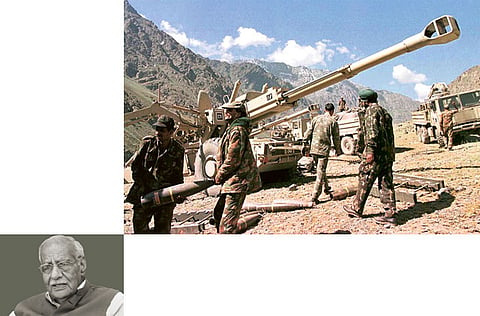Revisiting Bofors and Laxman
The Congress and the BJP during their rule used the Indian government machinery and intelligence agencies to serve their selfish purposes

Had corruption been the yardstick to judge, I would find no difference between the Congress and the Bhartiya Janata Party (BJP), the two political parties which occupy the largest space in India. Both have been disfigured by too many scams, too many times. Both parties live in glass houses and they should not, to use George Bernard Shaw's words, change clothes with the lights on.
The Congress has been revisited by the Bofors gun deal payoffs after 25 years. The BJP has been exposed by the conviction of Bangaru Laxman, who once headed the party, in an arms deal. Yet the Congress and the BJP remain deficient in sensitivity. One rationalises that the case has been ‘closed' and the other argues that the BJP has not at least put a gloss over the corrupt deal.
The reference is to former prime minister Rajiv Gandhi who covered the tracks so well that he left no evidence on the kickbacks, worth Rs650 million (Dh44.3 million). Still the fact remains that both parties during their rule used the government machinery and intelligence agencies to serve their purpose and in the process squeezed out the last drop of legal or moral decency in the system.
BJP leader Jaswant Singh has demanded a judicial commission on Bofors gun scandal. But he should go beyond and include Bangaru Laxman's case as well to find out who were the people or organisations behind him. Even if the commission is appointed, it may fail to get at the truth because the records have been fudged and proof destroyed. However, the findings may serve as a guide for the future to know how those in power manipulate the system to plug evidence.
The Bofors gun scandal takes the cake. It would not have seen the light of day if it had not been disclosed by a deep throat, a person who, in media parlance, gives information from within the system without coming out in the open. When the story about the Bofors deal was broken some 25 years ago, it shook the nation because the ‘deep throat' alleged that the commission was given by Bofors, a Swedish firm, to the then Rajiv Gandhi government to secure the deal.
The deep throat has again jolted the nation, this time by revealing his own identity — he is former Swedish police chief Sten Lindstrom — and accusing Gandhi of doing his best to cover up the scam, although he did not take bribes himself. I have no doubt that he is telling the truth. In contrast, see the lies by Gandhi who had the innocent hauled over coals to shield the bribe recipients. Why he did so is obvious. He used the middlemen to channelise the money to the party or the family he wanted to reach. That the middlemen too pocketed a part of the bribe as their commission is understandable because they took the risk. In any case, Gandhi saw to it that no harm came to them.
I think the biggest casualty in the Bofors scam is the credibility of the investigation agencies, particularly the Central Bureau of Investigation (CBI). The Congress may be right that Gandhi did not take any bribe. But there is no running away from the fact that a determined prime minister can mould the system, as he did in the case of the CBI.
The exoneration of Ottavio Quattrocchi, an Italian national, by the CBI is a black mark which will be difficult for the agency to wash away. It helped Quattrocchi to escape from India and to rub off connivance in the Bofors case which had become synonymous with corruption. True, the Congress is more to blame for hiding the truth. But the Vajpayee-headed government cannot escape unscathed. Why could it not find any evidence although some of its trusted men visited the Bofors plant and talked to its officials endlessly?
No accountability
Regarding the other case, a former union minister and a member of the BJP national executive, Laxman was convicted of taking bribes from a fake arms dealer for helping him win a fictitious army contract. He was forced to quit as BJP president immediately after Tehelka magazine made public the videotapes shot on March 13, 2001.
The real story is that the bureaucracy has become so malleable that the party in power can mould it in the way it likes. One adverse fallout is that the bureaucracy does not now follow any rules because there is no accountability. The Congress government obviously will not take any action against the officials involved. Nor would the BJP do so.
The press too has a lot to explain. Lindstrom says that he leaked the information but he could not do a journalist's job to probe and follow it up. Chitra Subramaniam did when she published stories with the information she got from Lindstrom. The same question stares us in the Laxman's case. Tehelka magazine exposed the corruption through a sting operation. But it had to face the wrath of the government. The undercover journalist, posing as an arms dealer, was harassed and hounded. So was the entire Tehelka team. No journalist came to Tehelka help because it is not a done thing.
Kuldip Nayar is a former Indian high commissioner to the United Kingdom and a former Rajya Sabha member.


